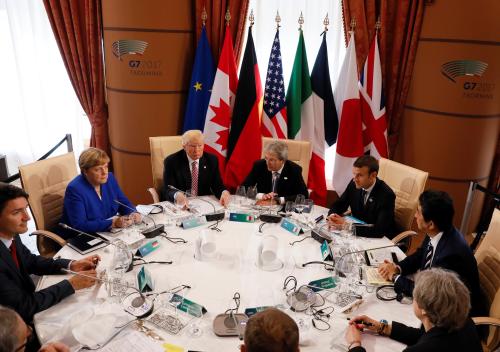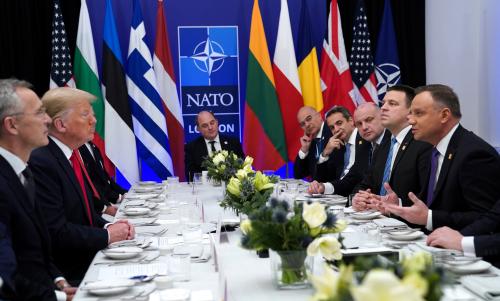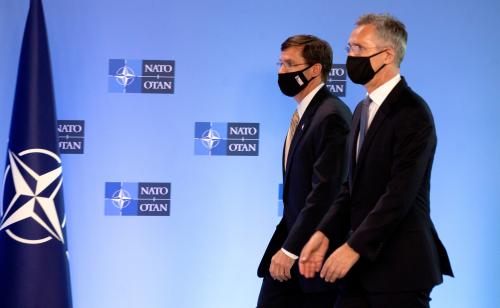Former vice president Joe Biden’s defeat of Donald Trump provides a major opportunity for the United States and its European allies to reimagine the trans-Atlantic relationship. In an article for the Brookings – Robert Bosch Foundation Transatlantic Initiative (BBTI), Agneska Bloch and James Goldgeier argue that the Biden administration should prioritize shifting the U.S. security relationship with Europe from domination toward more equal partnership, encouraging Europe to develop its own defense capacities, and seeking consensus to tackle the challenge posed by China. This piece originally appeared on the Robert Bosch Stiftung website.
For all of us who care about strong trans-Atlantic relations based on democratic values, a Joe Biden presidency is a welcome change from the past four years. Whereas Donald Trump argued for decades that America’s allies have taken advantage of the country and during his administration even called the European Union a “foe,” Biden spent those years steeped in the conviction that America’s alliances, especially NATO, are one of the country’s greatest strengths.
While we won’t know which party controls the United States Senate until after the runoff elections in the State of Georgia in January, long-standing bipartisan support for NATO on Capitol Hill and among the broader public give the president-elect much more room to maneuver on this issue – unlike on important domestic issues like green energy and health care legislation, over which a Republican-controlled Senate would constrain Biden’s ambitions.
The real question moving forward is not whether a Biden presidency will treat Europe differently, but whether Europeans will have been so scarred by the Trump years that they remain wary of America’s future. The Biden victory, along with European nervousness about American politics, will provide a major opportunity for the U.S. and its European allies to rethink the nature of the trans-Atlantic relationship. Meanwhile, the growing China challenge will loom large over the trans-Atlantic community in the coming years. While there is increasingly a bipartisan consensus in Washington over the threat China poses to American interests, forging trans-Atlantic consensus will require skillful diplomacy.
What Biden Is Likely to Do
It’s no wonder that Europeans breathed a sigh of relief when Joe Biden was officially projected to become the next President of the United States. Over the past four years, the German-American relationship especially has suffered. Trump has dubbed Chancellor Angela Merkel “stupid,” called Germany “very bad” for its U.S. trade surplus, and threatened to punish Berlin for not meeting NATO defense spending targets, all the while cozying up to authoritarian leaders in Europe and its neighborhood.
Joe Biden, by contrast, is a committed internationalist and trans-Atlanticist. Despite the political gridlock he will likely face at home, his victory is, at least in principle, good news for European officials. One who is sure to be relieved is Commission President Ursula von der Leyen, who recently stressed the necessity of a European Green Deal. While Biden’s climate plan is not a Green New Deal for the United States, the president-elect has vowed to rejoin the Paris climate accord on his first day in office and (like the EU) to cut U.S. emissions to net zero by 2050. Another reason Biden will be a friendlier face to Europeans is his intention to reset trans-Atlantic trade and economic relations. To avoid further spirals of protectionism, his administration will look for ways to end the “artificial trade war” pursued by President Trump against the EU.
When it comes NATO, Biden considers the alliance essential to American national security and to protecting liberal democracy around the world. For Europeans facing an increasingly aggressive Russia and a more globally assertive China, an American president committed to common defense is a welcome development. Biden has vowed to seek an extension of the New START treaty for strategic arms control with Russia and reduce the role of nuclear weapons, a priority for many Europeans.
The Opportunity for a Rethink of the Trans-atlantic Relationship
The United States remained committed to NATO at the end of the Cold War three decades ago because it believed it needed to remain in charge of European security. U.S. officials saw their dominant role in European security as necessary to keep the peace on the continent and take advantage of the opportunities presented by the collapse of the Soviet Union to help foster a Europe “whole and free,” eliminating the sources of conflict that had bedeviled it during the 20th century.
Europeans generally saw the situation the same way in the early 1990s. The leaders of France, the United Kingdom, and Poland worried about the future course of a united Germany. Europe’s inability to stop the genocide in Bosnia was a reminder of the role the United States still needed to play to keep the peace. The newly free Central and Eastern Europeans feared that their futures would be more uncertain vis-à-vis Russia if the United States decided not to maintain and even enlarge its post-World War II role in Europe.
In the Obama years, Europeans worried about the U.S. commitment to Europe waning as America “pivoted” to Asia. Trump’s attitudes led to fears that the United States would actually leave NATO, something that was likely to happen in a second Trump term. The U.S. recognition that it needs to focus more attention on Asia, compounded by European unease regarding the steadiness of the American commitment, provides a great opportunity in a Biden presidency to rethink the nature of the trans-Atlantic relationship.
The United States no longer has to believe NATO needs to serve as a vehicle for American domination of European security. The United States plays an important role, providing extended nuclear deterrence, lending capabilities when necessary for particular missions, and serving as a coordinator between Asian and European democracies to address the challenge from key authoritarian states. NATO remains important for trans-Atlantic security cooperation, but an overbearing U.S. role in Europe should no longer be necessary.
Reimagining the relationship requires that Europe prioritize building its defense capabilities, as German officials such as Kramp-Karrenbauer are suggesting, and Chancellor Merkel has indicated. The U.S. should encourage those efforts, even if they are primarily achieved through European Union mechanisms rather than NATO. Greater U.S.-EU and EU-NATO coordination is long overdue. As the U.S. continues rebalancing its foreign policy toward Asia, it can only do so successfully with a stronger Europe able to act more independently in its own neighborhood. The U.S.-Europe security relationship should evolve from one of dominance and subordination to one of supportive partners.
Are We All China-Focused Now?
More than anything, the Biden administration’s overarching priority beginning in January 2021 will be to rehabilitate American leadership through a renewed focus on democracy – at home and abroad. The president-elect has pledged to organize a global Summit for Democracy during his first year in office to “strengthen our democratic institutions, honestly confront nations that are backsliding, and forge a common agenda.” For Biden, such groupings will be a first line of defense against the challenge posed by China, not only in creating a united front against the Chinese Communist Party’s egregious human rights violations, but also in developing alternatives to Huawei.
Both domestically and internationally, the president-elect is in luck on this part of his agenda. In Washington, no foreign policy issue has more bipartisan support than getting tough on China. Given the likelihood that Biden’s most ambitious efforts on domestic policy will be stymied if the GOP maintains control of the Senate, seeking agreement on China policy, and particularly on trade, may be the place to start. When it comes to trans-Atlantic priorities too, Europeans are more prepared to get tough on China than ever before. And Biden actually borrows a line from the European playbook vis-à-vis China, suggesting that he recognizes that the threat it poses is disanalogous to that posed by the USSR during the Cold War. In an echo of the March 2019 EU-China Strategic Outlook, which described China as a “negotiating partner,” “economic competitor,” and “systemic rival,” Biden argues that the U.S. must both “get tough on China” and find ways to cooperate with it on transnational crises like climate and health.
Europeans and Americans alike know that balancing toughness and cooperation with China is an easier task to accomplish jointly than separately. But Europeans are likely to remain at arm’s length of the United States even under the Biden administration. Despite the Republican loss of the White House, strong turnout for Trump confirmed that his presidency was no aberration. Although Trump will be out of the Oval Office on January 20, Trumpism in the GOP – the Grand Old Party, the Republicans – is here to stay. Nonetheless, Biden’s win is a much-needed reminder to trans-Atlantic allies that close relations are back at the forefront of U.S. foreign policy. While there is no guarantee that the collaboration we will see in the Biden years will continue after 2025, the agenda for the near future is clear: reimagining the U.S. security relationship with Europe from domination toward more equal partnership, coordinating as Europe seeks to develop greater defense capacities, and seeking consensus in the face of the rise of China.
The Brookings Institution is committed to quality, independence, and impact.
We are supported by a diverse array of funders. In line with our values and policies, each Brookings publication represents the sole views of its author(s).









Commentary
Reviving the trans-Atlantic relationship
November 17, 2020